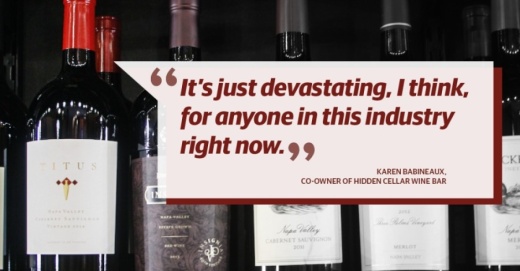After initially allowing bars to reopen at 25% capacity in late May, Texas Gov. Greg Abbott reversed course as coronavirus cases and hospitalizations hit record highs across the state, announcing with a June 26 executive order that bars would once again be required to shut down.
The order—which specifically targets entities that make more than 51% of their revenue from the sale of alcoholic beverages—quickly netted criticism from those within the industry, including a lawsuit filed against Abbott by 30 bar owners.
Karen Babineaux, who co-owns The Hidden Cellar Wine Bar on House & Hahl Road in Cypress with her business partner Lisa Sprague, said she understands the reasoning behind Abbott's order but thinks it should be refined to take into account that some businesses are more likely to spread the coronavirus than others.
"It was hard for us to understand that we were being blamed for the rise of the COVID-19 virus when the strip clubs are still open," Babineaux said in a July 2 phone interview. "I think that [Abbott] definitely had some fair concerns with the night clubs and the dance clubs that house 500 people or more, but small mom and pop venues such as ourselves that don’t even serve hard liquor—there needs to be maybe a subcategory."
Babineaux's thoughts echoed those of other north Houston area bar owners, who have argued that, instead of targeting all venues that exceed the 51% threshold, officials should instead be cracking down on places that do not follow social distancing guidelines. Meanwhile, a separate movement has launched calling on Abbott to reopen winery tasting rooms and brewery taprooms, with proponents making similar arguments.
Prior to the second shutdown, Babineaux said her venue had been rearranged to allow for social distancing and could seat about 25 people safely. Although The Hidden Cellar is still offering to-go orders of wine and charcuterie boards, Babineaux said those sales do not come close to making up for the loss in revenue from in-house sales.
Hidden Cellar's two owners received a loan from the Paycheck Protection Program during the first shutdown, which Babineaux said was used in its entirety to pay her staff for eight weeks. With that money spent, she said the second shutdown order forced her to let her staff go.
"Some days there are two to-go orders, [and] some days there are 10, but that doesn’t fill in any gap really," Babineaux said. "To-go orders just aren't enough revenue to pay a staff, period."
Even after the shutdown is lifted, Babineaux said she worries about the long-term fears people will have about bars. The number of people who were coming into The Hidden Cellar for the brief time it was open was still much lower than before the pandemic, she said.
Brew:30 Taphouse on Telge Road in Cypress is another venue that has turned to to-go sales to try to stay afloat, putting together an online store where customers can buy beer to-go and other merchandise. In an interview with Community Impact Newspaper prior to the June 26 shutdown, Brew:30 co-owner Gary Marler said the revenue coming in was still well short of what was needed to break even.
"We were doing a lot more [to-go orders] than before, but none of that replaced the sales volume we need to be at to be successful," he said.
Marler said he experimented with offering beer via delivery, but demand was not strong. Starting July 8, Brew:30 will be rolling out a new delivery offer with Rockwell Grill where customers can order crowlers from Brew:30 and chicken wings from Rockwell in a package deal, according to a recent Facebook post.
Moving forward, Babineaux said she hopes to see some revision to the shutdown order that gives more lenience to mom and pop venues. She said it is hard to say what the future holds for her business.
"There’s no way to project it; we have no end in sight," Babineaux said. "It’s just devastating, I think, for anyone in this industry right now."





